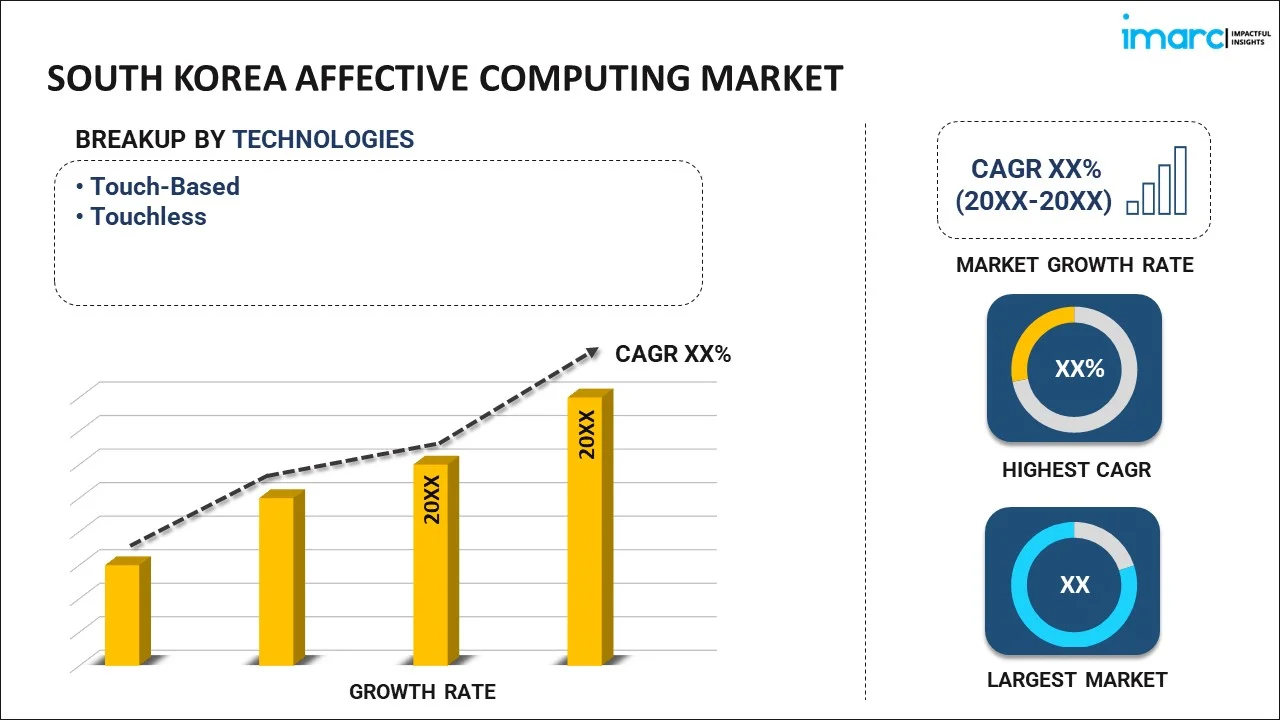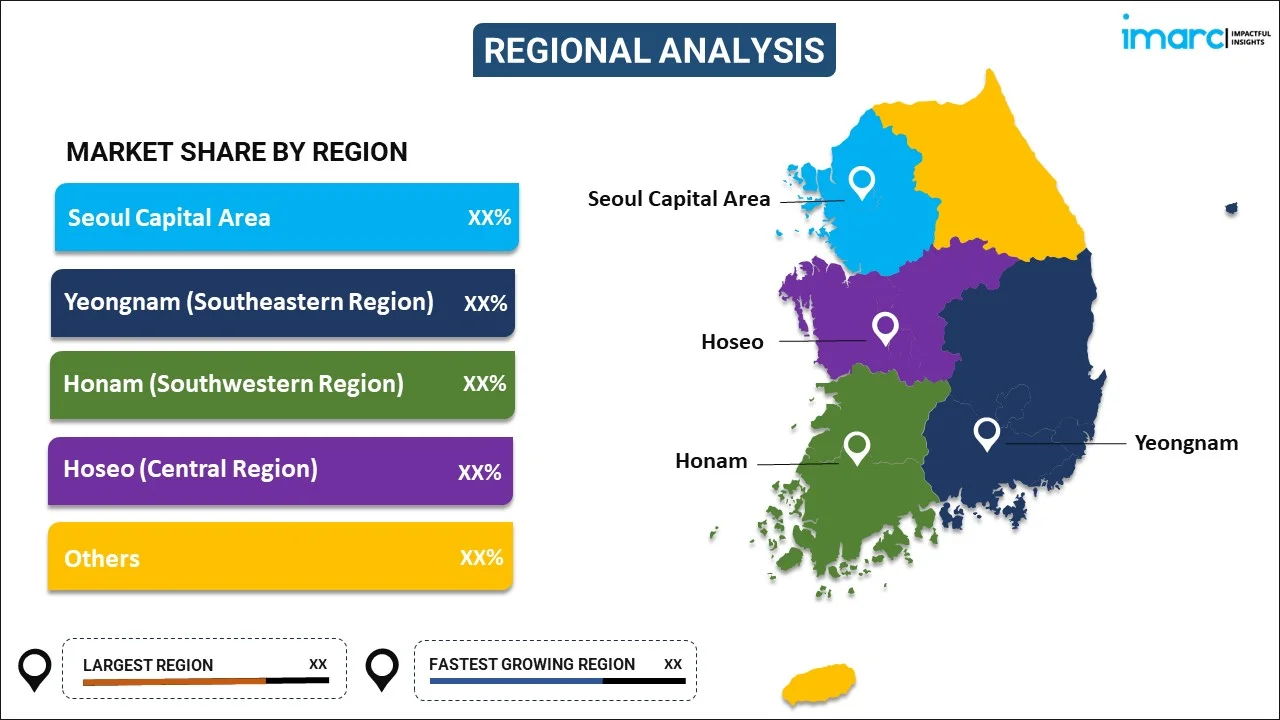
South Korea Affective Computing Market Report by Technology (Touch-Based, Touchless), Component (Hardware, Software), End Use (Automotive, BFSI, Government, Healthcare, IT and Telecom, and Others), and Region 2025-2033
Market Overview:
South Korea affective computing market size reached USD 1.7 Billion in 2024. Looking forward, IMARC Group expects the market to reach USD 14.2 Billion by 2033, exhibiting a growth rate (CAGR) of 26.8% during 2025-2033. The inflating focus on creating personalized and adaptive learning experiences for students, along with the widespread adoption of machine learning (ML) models, is primarily driving the market growth across the country.
|
Report Attribute
|
Key Statistics
|
|---|---|
|
Base Year
|
2024
|
|
Forecast Years
|
2025-2033
|
|
Historical Years
|
2019-2024
|
| Market Size in 2024 | USD 1.7 Billion |
| Market Forecast in 2033 | USD 14.2 Billion |
| Market Growth Rate 2025-2033 | 26.8% |
Referred to as emotion AI, affective computing is an amalgamation of cognitive science, psychology, and computer science that detects the non-verbal emotional cues exhibited by individuals. Through the utilization of an analytics engine, big data, machine intelligence, and various sensors, it evaluates a person's emotions. This technology proves valuable for businesses seeking to improve the overall user experience and optimize product sales. Consequently, affective computing sees widespread use in autonomous systems and e-learning platforms throughout South Korea.
South Korea Affective Computing Market Trends:
The South Korea affective computing market stands at the forefront of innovative technological integration, blending cognitive science, psychology, and computer science to decipher non-verbal emotional signals in human beings. One of the prominent applications of affective computing in the nation lies in its role in autonomous systems and e-learning platforms. In autonomous systems, such as robotics and artificial intelligence, affective computing enhances the machines' ability to comprehend and respond to human emotions, thereby improving the overall interaction and user experience. Moreover, this is particularly valuable in sectors like customer service, where understanding and responding to user emotions are crucial for effective engagement. Apart from this, by gauging the emotional state of learners, the technology can tailor educational content to individual needs, providing a more effective and engaging learning environment. The South Korea affective computing market is instrumental in reshaping user experiences and sales strategies for businesses. Additionally, by gaining insights into the emotional responses of users, companies can refine their products and services, leading to more effective marketing and increased customer satisfaction. As South Korea continues to be a technology-driven hub, the affective computing market is poised for significant growth. The integration of emotion AI in various industries reflects the nation's commitment to harnessing advanced technologies for enhanced human-machine interaction and personalized experiences. This, in turn, is expected to fuel the market growth over the forecasted period.
South Korea Affective Computing Market Segmentation:
IMARC Group provides an analysis of the key trends in each segment of the market, along with forecasts at the country level for 2025-2033. Our report has categorized the market based on technology, component, and end use.
Technology Insights:

- Touch-Based
- Touchless
The report has provided a detailed breakup and analysis of the market based on the technology. This includes touch-based and touchless.
Component Insights:
- Hardware
- Sensors
- Cameras
- Storage Devices and Processors
- Others
- Software
- Analytics Software
- Enterprise Software
- Facial Recognition
- Gesture Recognition
- Speech Recognition
A detailed breakup and analysis of the market based on the component have also been provided in the report. This includes hardware (sensors, cameras, storage devices and processors, and others) and software (analytics software, enterprise software, facial recognition, gesture recognition, and speech recognition).
End Use Insights:
- Automotive
- BFSI
- Government
- Healthcare
- IT and Telecom
- Others
The report has provided a detailed breakup and analysis of the market based on the end use. This includes automotive, BFSI, government, healthcare, IT and telecom, and others.
Regional Insights:

- Seoul Capital Area
- Yeongnam (Southeastern Region)
- Honam (Southwestern Region)
- Hoseo (Central Region)
- Others
The report has also provided a comprehensive analysis of all the major regional markets, which include Seoul Capital Area, Yeongnam (Southeastern Region), Honam (Southwestern Region), Hoseo (Central Region), and others.
Competitive Landscape:
The market research report has also provided a comprehensive analysis of the competitive landscape. Competitive analysis such as market structure, key player positioning, top winning strategies, competitive dashboard, and company evaluation quadrant has been covered in the report. Also, detailed profiles of all major companies have been provided.
South Korea Affective Computing Market Report Coverage:
| Report Features | Details |
|---|---|
| Base Year of the Analysis | 2024 |
| Historical Period | 2019-2024 |
| Forecast Period | 2025-2033 |
| Units | Billion USD |
| Scope of the Report | Exploration of Historical and Forecast Trends, Industry Catalysts and Challenges, Segment-Wise Historical and Predictive Market Assessment:
|
| Technologies Covered | Touch-Based, Touchless |
| Components Covered |
|
| End Uses Covered | Automotive, BFSI, Government, Healthcare, IT and Telecom, Others |
| Regions Covered | Seoul Capital Area, Yeongnam (Southeastern Region), Honam (Southwestern Region), Hoseo (Central Region), Others |
| Customization Scope | 10% Free Customization |
| Post-Sale Analyst Support | 10-12 Weeks |
| Delivery Format | PDF and Excel through Email (We can also provide the editable version of the report in PPT/Word format on special request) |
Key Questions Answered in This Report:
- How has the South Korea affective computing market performed so far and how will it perform in the coming years?
- What has been the impact of COVID-19 on the South Korea affective computing market?
- What is the breakup of the South Korea affective computing market on the basis of technology?
- What is the breakup of the South Korea affective computing market on the basis of component?
- What is the breakup of the South Korea affective computing market on the basis of end use?
- What are the various stages in the value chain of the South Korea affective computing market?
- What are the key driving factors and challenges in the South Korea affective computing?
- What is the structure of the South Korea affective computing market and who are the key players?
- What is the degree of competition in the South Korea affective computing market?
Key Benefits for Stakeholders:
- IMARC’s industry report offers a comprehensive quantitative analysis of various market segments, historical and current market trends, market forecasts, and dynamics of the South Korea affective computing market from 2019-2033.
- The research report provides the latest information on the market drivers, challenges, and opportunities in the South Korea affective computing market.
- Porter's five forces analysis assist stakeholders in assessing the impact of new entrants, competitive rivalry, supplier power, buyer power, and the threat of substitution. It helps stakeholders to analyze the level of competition within the South Korea affective computing industry and its attractiveness.
- Competitive landscape allows stakeholders to understand their competitive environment and provides an insight into the current positions of key players in the market.
Need more help?
- Speak to our experienced analysts for insights on the current market scenarios.
- Include additional segments and countries to customize the report as per your requirement.
- Gain an unparalleled competitive advantage in your domain by understanding how to utilize the report and positively impacting your operations and revenue.
- For further assistance, please connect with our analysts.
 Request Customization
Request Customization
 Speak to an Analyst
Speak to an Analyst
 Request Brochure
Request Brochure
 Inquire Before Buying
Inquire Before Buying




.webp)




.webp)












